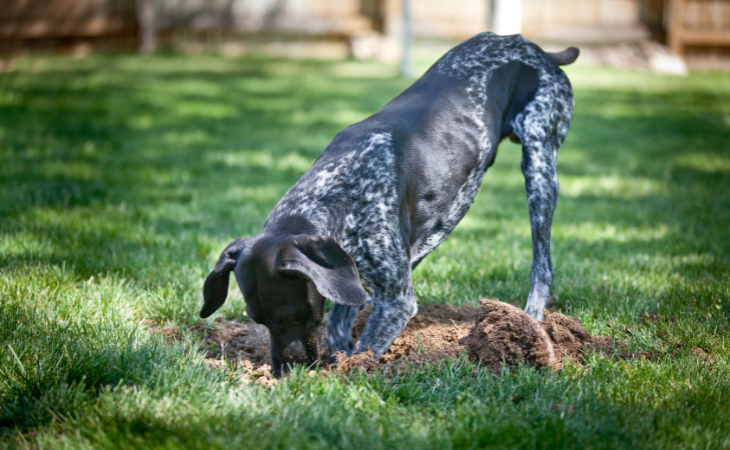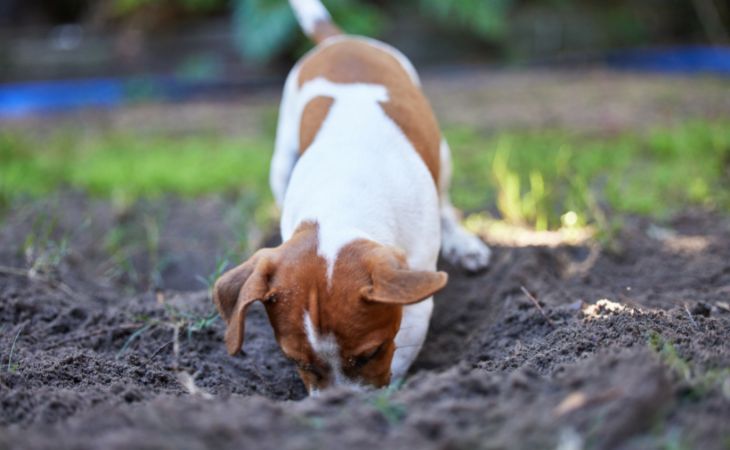Dogs naturally love to dig. However, this behavior can become problematic if it becomes too frequent. If your dog is digging everywhere, it is important to understand the reasons why your dog feels the need to dig before trying to stop your dog from digging. In this article, we will share the reasons why dogs dig and tips on how to prevent this behavior.
The reasons why dogs feel the need to dig
Several reasons can explain why dogs feel the need to dig. Here are a few reasons why!
Digging for fun
For certain dog breeds such as Dachshunds or Terriers for example, digging is an innate behavior. The ancestors of these dog breeds were obligated to dig in the dirt to make beds for themselves. These holes were also used as places to hide resources that they could use later. These breeds are genetically bred to dig and search for objects or prey that are buried in the ground.
Trying to fix this behavior could be quite difficult. If you prevent these dog breeds from digging by keeping them inside for example, your pet could have destructive behavior or develop behavioral problems such as excessive barking.
Digging to avoid boredom
Dogs can get bored easily if they are not active for a long time. This can lead them to dig to expend their energy. This behavior is common for very active dogs who have a lot of energy to expend. It is therefore normal for these dogs to feel the need to dig to let off steam, find insects, smell new smells or find new branches or objects to play with.
Digging because they are scared or stressed
Dogs can dig to feel safe. If they find themselves alone in an area that they are not familiar with, dogs can feel the need to dig to escape. This can happen when you move, when there are fireworks or thunderstorms, or if you leave your dog alone somewhere. In cases like this, it is ideal to keep your four-legged friend inside or construct an enclosure for your dog where they can hide and feel safe. If you need to leave your dog alone in a new place, it is best to book a doggy daycare for them. They will be in the company of other dogs and will be able to have fun at the same time.
Digging to protect themselves
During warmer seasons, especially if there is not enough shade, dogs can dig holes so that they can nestle in the fresh soil. If dogs are wet or cold, they may also seek shelter by digging in the dirt. If you notice your dog lying down in the holes they’ve dug, they’re most likely looking for shelter from the weather. In cases like this, you should consider providing a shelter for your dog to hide in.
Digging for attention
Dogs are intelligent and attentive animals. They are quick to pick up on the way you do things or react. If your dog sees that this behavior attracts your attention, they may be tempted to repeat it to capture your attention again. This usually means that your pet needs some sort of mental stimulation or activity. Remember that anything your dog does, whether good or bad, can quickly become a means of getting your attention if your dog understands that it draws your attention. If your dog doesn’t see you regulary, they may believe that by digging, they will be able to interact with you better, even if it means being punished.
How to prevent your dog from digging
When you train your dog, you need to be both gentle and firm. If you do not catch your dog digging, it is useless to punish them. Your dog will not understand the reason why you are punishing them and will most likely do it again. Here are a few tips that you can use to limit this behavior.
Set up fences
Your dog will be less likely to dig if you cut off their access to the places where they love to dig. For this reason, the first step to helping your dog stop digging is to prevent your dog from digging in the areas that you don’t want them to. If your dog has gotten into the habit of digging in your flowerbeds, it is best to set up fences around them so that you can limit your dog’s access to these areas. If you notice that your dog digs in the same area all the time, you can also put a rock on top of it. These measures help your dog adopt different behaviors.
Keep your dog busy
As we have underlined, dogs can dig out of boredom. For this reason, it is important that your dog takes part in activities that allow them to expend their energy. These activities will make your bond with your dog stronger and they will be less likely to be in need of attention. Here are a few tips to keep your dog busy:
- go on frequent walks and let your dog sniff their environment to help stimulate them,
- offer mental and chewing activities (bones, chew toys),
- arrange activities with other dogs to meet your dog’s need for exercise and socialization,
- play frisbee, tug-of-war, or catch with your dog for at least 30 minutes per day to help your dog expend their energy.
Of course, breeds such as working dog breeds and primitive dog breeds need to expend more energy. In this case, you can increase the duration of their physical activities.

Teach your dog to stop digging
To help your dog fix this behavior, it is important to teach your dog to stop digging without punishing them. Keep an eye on your dog so that you can catch your dog in the act. When you see your dog digging, tell your dog to stop by using the same word every time that you see them doing it. For example, you can say “stop”, “no”, or any other word that you choose. To encourage your dog to stop, you should do a positive gesture for your dog when they stop. For example, you can give your dog a treat so that they associate the command with a treat as a reward.
To get your dog to associate the command with a treat, say “no” without a reason and then give them a treat. Repeat this exercise several times. When they start to understand, put in place a small distraction so that they can learn to stop their current behavior and come to you when they hear this word. Remember to be patient though. Training your dog this way will probably not go as fast as you would hope.
Allow your dog to dig in a specific area
Digging is a fun activity for dogs. When they dig, they are using their energy and their sense of smell. If your dog digs in the right area, it’s not problematic. You can therefore limit the zone and convince your dog to dig only in this area. If your dog doesn’t dig in the right place, use commands to stop your dog and then accompany your dog to the designated area to dig. Remember to encourage them to associate this with a positive event.
Guide your dog towards a different behavior
When your dog starts to dig, another tip is to propose another interesting activity to your dog. After telling your dog to stop, propose a play session with your dog or another activity that they love. You can also take your dog for a walk or give your dog a chew toy. Whichever method you choose, be patient and gentle with them. Keep in mind that your dog can take some time to understand what you are saying.
You can also read this article: How to take care of your dog’s claws

